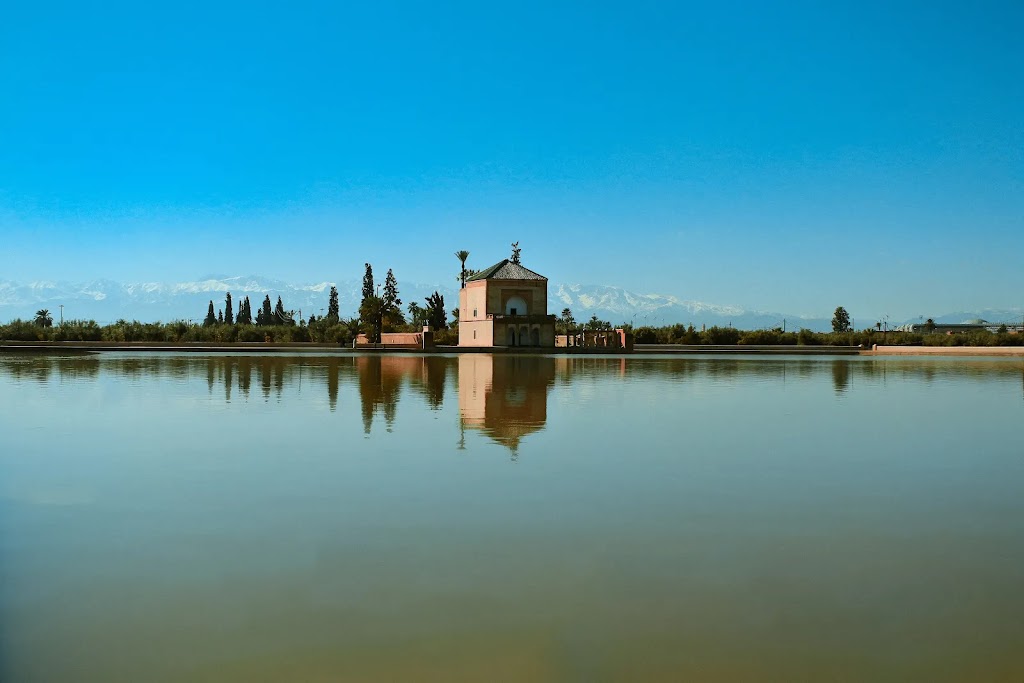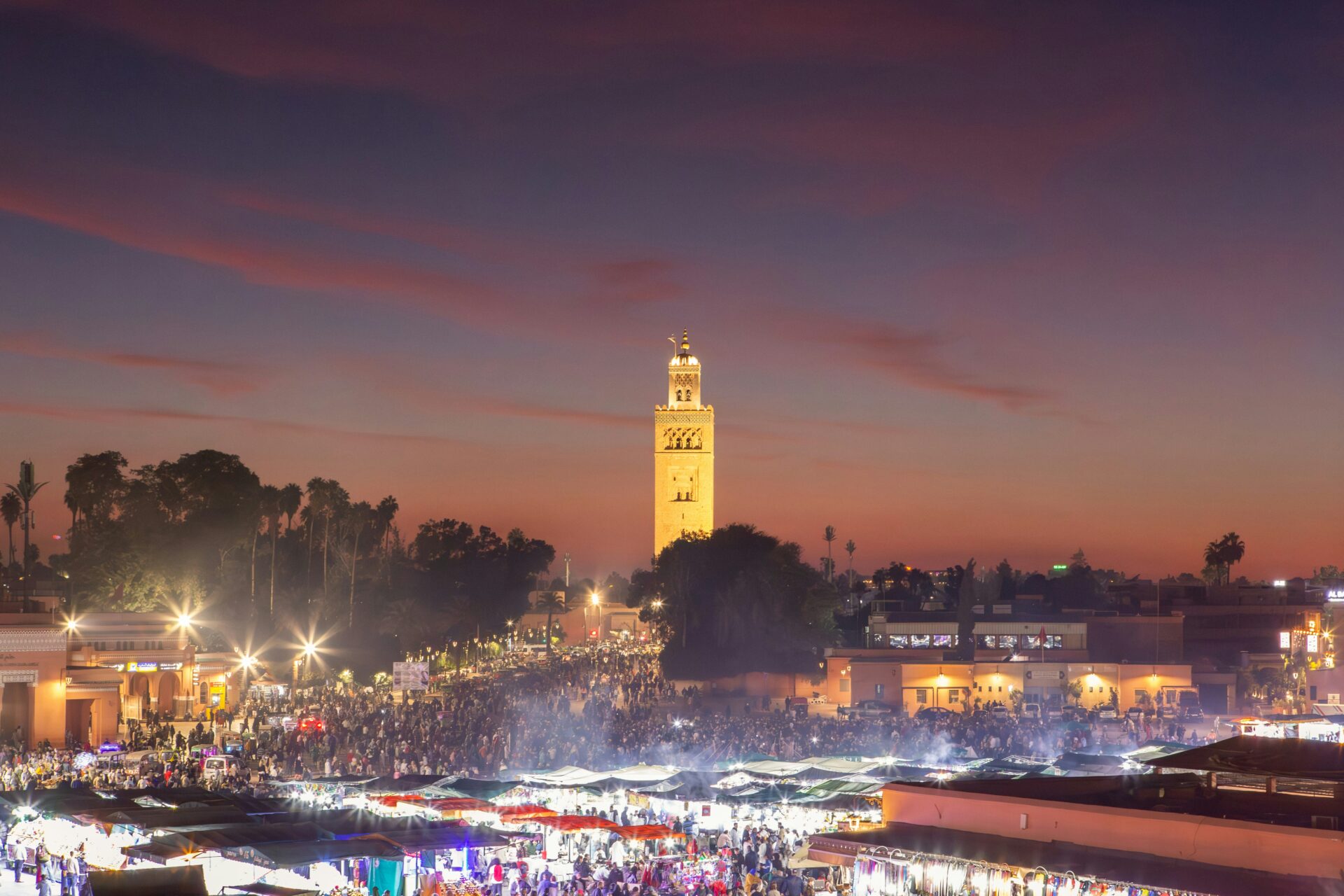The Ultimate Marrakech to Sahara Desert Trip: A 3-Day Itinerary
It’s the most iconic journey in Morocco: a multi-day adventure that takes you from the vibrant chaos of Marrakech, across the majestic High Atlas Mountains, and into the profound, silent sea of the Sahara Desert. This isn’t just a road trip; it’s a rite of passage for any traveler seeking the country’s soul.
But how do you plan the perfect Marrakech to Sahara desert trip? This comprehensive guide, based on countless local journeys, will walk you through the classic 3-day itinerary, share essential insider tips, and help you plan the adventure of a lifetime.
Is a 3-Day Desert Trip from Marrakech Worth It?
Let’s be honest: it involves a lot of driving. But is it worth it? Absolutely, yes. In just three days, you will witness more of Morocco’s diverse landscapes than on any other short trip. You’ll journey from bustling cityscapes to snow-capped peaks, ancient kasbahs, and finally, the breathtaking golden dunes of Merzouga. It’s a compressed but incredibly rewarding adventure, and a key part of any comprehensive Marrakech travel guide.
The Classic Marrakech to Sahara Desert Trip Itinerary
Here’s a breakdown of what you can expect on the most popular 3 day desert trip from Marrakech.
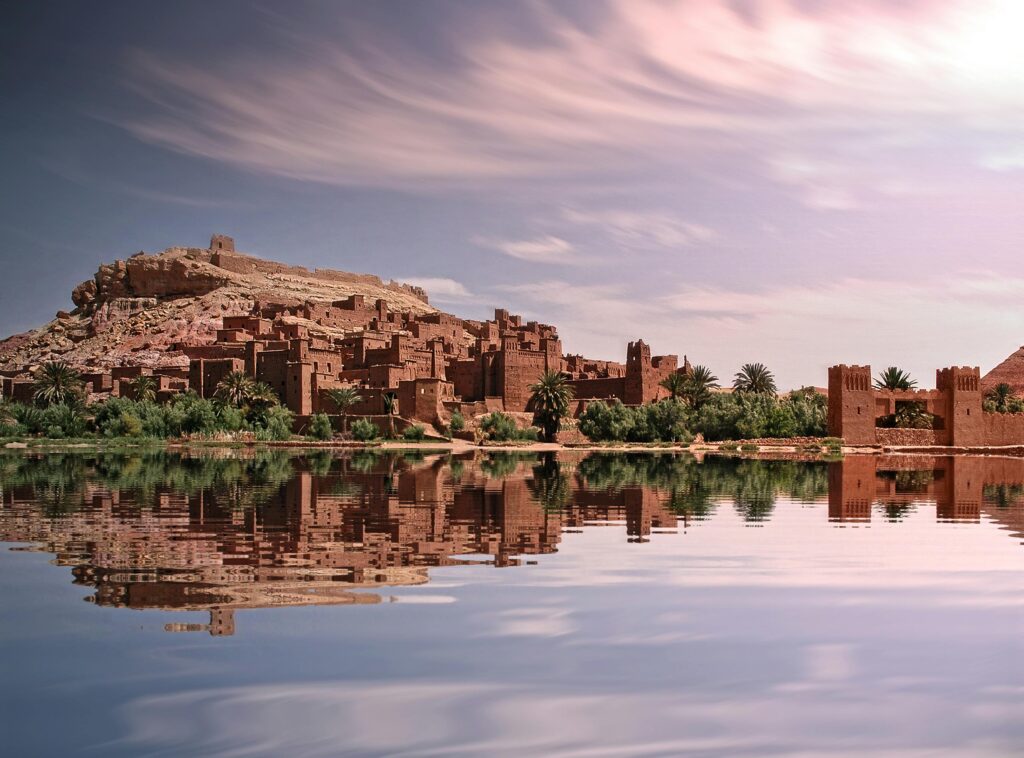
Day 1: Crossing the High Atlas Mountains & Reaching the Gorges
Marrakech → High Atlas Mountains → Aït Ben Haddou → Dades Valley
What You’ll See & Do:
Your adventure begins with an early departure from Marrakech, leaving behind the hustle of the medina as you ascend into the High Atlas Mountains. The road winds through stunning landscapes and over the Tizi n’Tichka Pass (2,260 m), offering panoramic views and photo stops along the way.
Pause in a traditional Berber village for mint tea and learn about local life before continuing to the legendary Aït Ben Haddou, a UNESCO World Heritage Site. This ancient ksar (fortified village), made of clay and stone, has been a backdrop for iconic films like Gladiator and Game of Thrones. Wander through its narrow alleyways and explore its historic granaries for a glimpse into Morocco’s past.
After lunch, continue toward Ouarzazate, often called the “Hollywood of Africa,” and visit the Taourirt Kasbah or a local film studio if time allows. The journey then takes you along the Road of a Thousand Kasbahs, lined with mud-brick fortresses, toward the Dades Valley. Here, the dramatic Dades Gorges and unique rock formations known as the “Monkey Fingers” await.
Check into your riad or guesthouse nestled in the valley and enjoy a traditional Moroccan dinner under the starry sky.
Estimated driving time: ~7 hours (with scenic stops)
Overnight: Dades Valley (guesthouse or riad)
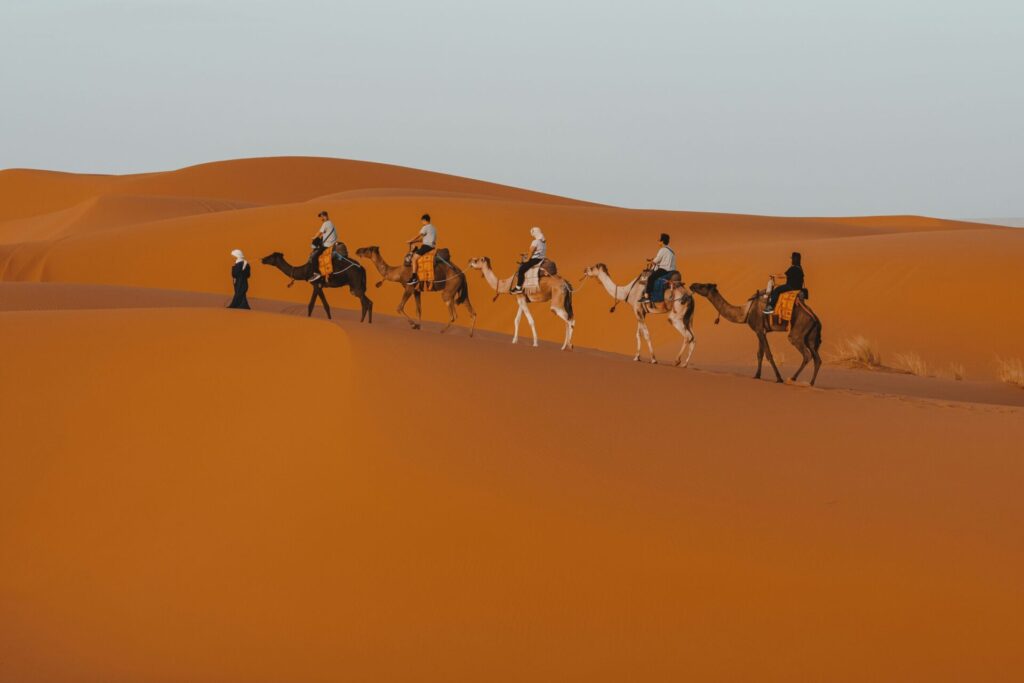
Day 2: Canyons, Oases, and Your Merzouga Desert Tour
Route: Dades Valley → Tinghir → Todgha Gorges → Erg Chebbi (Merzouga)
What You’ll See & Do:
After breakfast, set out toward Tinghir, an oasis town famous for its lush palm groves and the Todgha Gorges, a spectacular canyon with limestone cliffs soaring up to 300 meters high. Take a leisurely walk along the river or enjoy a mint tea at a local café while admiring this natural wonder.
Continue the journey through Berber villages and the Ziz Valley, dotted with date palms, until you reach Erfoud, known for its fossils and date markets. This is a great spot for a quick stop before heading to the Sahara.
By late afternoon, you’ll arrive at Merzouga, the gateway to the Erg Chebbi dunes. Here, switch to a camel caravan (about 1 hour) or opt for a 4×4 ride if you prefer not to ride a camel. As you trek through the dunes, watch the sunset paint the desert in shades of gold and crimson – an unforgettable experience.
At your desert camp, enjoy Berber hospitality with mint tea, traditional music around a campfire, and a hearty Moroccan dinner. Try sandboarding or simply lie back to stargaze in one of the clearest skies on Earth.
Estimated driving time: ~6 hours (with scenic stops)
Overnight: Desert camp in Merzouga (standard or luxury options available)
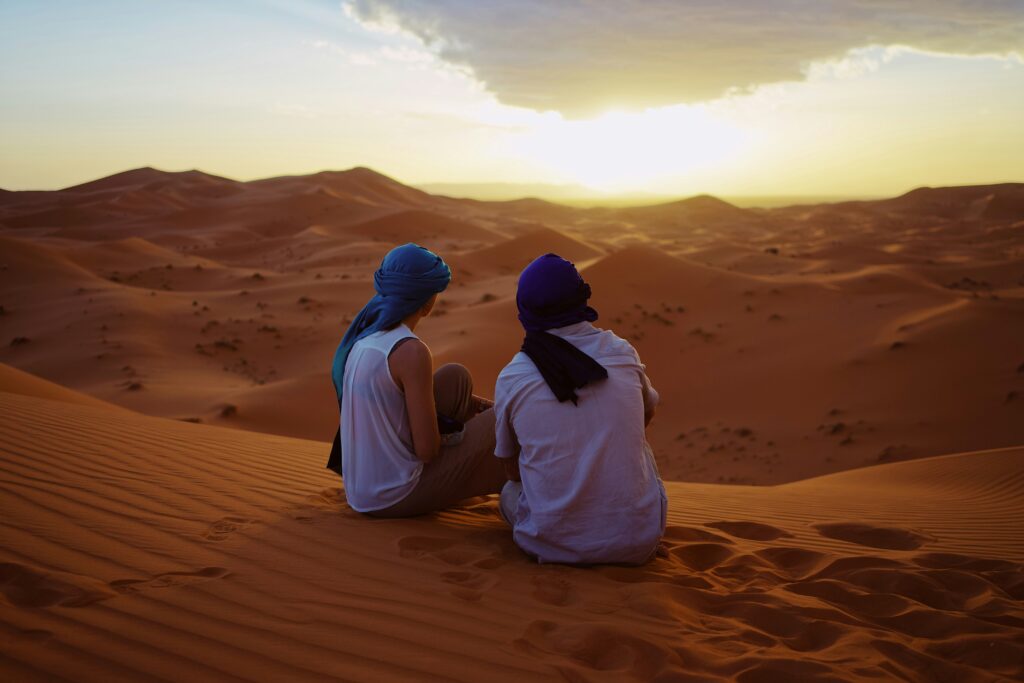
Day 3: Sahara Sunrise & the Journey Home
Route: Merzouga → Marrakech
What You’ll See & Do:
Wake up early to witness a magical sunrise over the dunes – a moment that will stay with you forever. After breakfast in the camp, ride your camel (or 4×4) back to the village and begin the return journey.
The route back to Marrakech retraces the High Atlas Mountains, passing by Erfoud, Ouarzazate, and the Tizi n’Tichka Pass. Stop for photos and lunch along the way before arriving in Marrakech by early evening.
Estimated driving time: ~9–10 hours
Alternative: Continue your trip to Fez instead of Marrakech, making it a perfect loop across Morocco.
How to Choose Your Marrakech to Sahara Desert Tour
You have two main options for this trip. This section of our Marrakech travel guide will help you decide.
Group Tours: Budget-friendly and great for meeting other travelers. The itinerary is fixed.
Private Tours: Offers maximum flexibility to stop where you want. More expensive but provides a personal experience.
→ Explore a selection of the best-rated tours on our Adventure Treks Page.
Essential Packing List for Your Desert Trip
- Scarf or Turban: Essential for sun and sand protection.
- Sunscreen & Sunglasses: The desert sun is intense.
- Warm Jacket: Desert nights get very cold.
- Small Overnight Bag: For your stay at the camp.
- Cash: For tips and small purchases.
Your Marrakech to Sahara Desert Trip: FAQ
Merzouga or Zagora: Which desert should I choose?
For the iconic tall, golden dunes, your Marrakech to Sahara desert trip must go to Merzouga (Erg Chebbi). Zagora is closer but has smaller, rockier dunes.
When is the best time of year for a desert trip?
The best times for a **Marrakech to Sahara desert trip** are during the spring (March to May) and autumn (September to November). During these months, daytime temperatures are warm and pleasant, and the nights are cool but comfortable. Summer (June to August) can be extremely hot, with daytime temperatures often exceeding 40°C (104°F). Winter (December to February) is possible, but desert nights can be freezing cold.
What are the toilets like at the desert camp?
Most modern camps have shared or private bathrooms with running water and flush toilets.
Will I have phone signal in the desert?
No. Prepare to be disconnected, which is a beautiful part of the experience!
Is it easy to get around without speaking French or Arabic?
In major tourist areas like Marrakech, Fes, and coastal towns, you can get by with English. However, learning a few basic Arabic words like “Salam” (Hello) and “Shukran” (Thank you) will be greatly appreciated and will open many doors. We have a guide with useful phrases on our blog!
Do I need any specific vaccinations?
No specific vaccinations are required for entry into Morocco. However, it’s always a good practice to ensure your routine vaccinations (like tetanus) are up to date. For any health-related advice, we strongly recommend consulting your doctor or a travel clinic before your trip.

